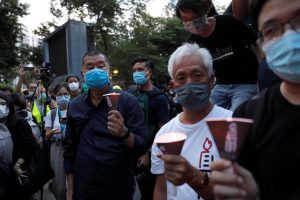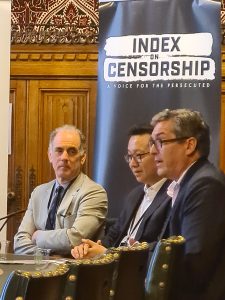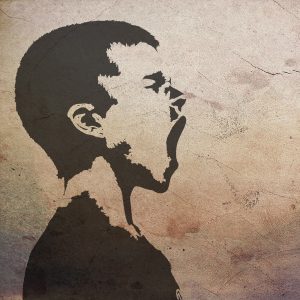27 Apr 2023 | China, FEATURED: Francis Clarke, Hong Kong, Jimmy Lai, News and features, Political prisoners, Spotlight, United Kingdom
The UK government is failing to acknowledge a British citizen unfairly imprisoned in Hong Kong amid a wider targeting of journalists and pro-democracy campaigners in the city state, said the authors of a new report on issues of freedom in Hong Kong.
On Monday, the All-Party Parliamentary Group on Hong Kong (APPG) met at Portcullis House, London, to discuss their new report, Inquiry into Media Freedom in Hong Kong: The case of Jimmy Lai and and Apple Daily, which offers a sobering look into the state of media freedoms in the once vibrant city. Index contributed to the report.
The session was headed by Baroness Bennett of Manor Caste, the joint chair of the APPG. Other speakers included Lai’s international lawyer, Caoilfhionn Gallagher KC, Baroness Helena Kennedy and Sebastian Lai, Jimmy Lai’s son.
One of the aims of the report is to provoke a response from the British government regarding Lai. A pro-democracy figure, media tycoon and British citizen, he is in a Hong Kong prison after sentencing for unauthorised assembly and fraud charges. In addition to these charges are more serious ones of violating Hong Kong’s national security law, which was passed in 2020. Six of his colleagues at Apple Daily, the newspaper founded by Lai, are also in jail charged under the national security laws.
Kennedy believes the case of Jimmy Lai should be treated as a political priority by the UK government not only because Lai is a British citizen, but also because of the the joint declaration that gives the UK a place in trying to guarantee the rights of people in Hong Kong.
She added: “It is the illegitimate use of law against a citizen by the government, and against the protection of media freedom and expression in Hong Kong.”
Lord Alton of Liverpool, a vice chair of the APPG, echoed Kennedy’s called for Magnitsky-style sanctions against allies of the Hong Kong authorities in the UK as further action is needed. “We have to go beyond sanctions, to freezing the assets and redeploying the resources of those who have been able to use London as a place for their activities,” he said.
Gallagher said the Hong Kong authorities have weaponised their laws to target pro-democracy campaigners and journalists in new ways. Gallagher, who represents Jimmy Lai, as well as Maria Ressa from the Philippines who was charged with tax evasion, says that this is a new tactic – trying to discredit them by painting them as bad people rather than using the more traditional tactic of defamation. “It’s straight from the dictators’ playbook,” she said.
Kennedy echoed this by stating fraud and tax affair charges are common tactics used against journalists in Hong Kong before more serious charges are later served. They added that as a result of supporting Lai they’ve received a series of threats and intimidation from state actors.
Sebastian Lai said he is also a target for the Chinese authorities. He acknowledged international support regarding his father’s cause but expressed disappointment in the UK government’s attitude. He said: “The language the UK government has used has been nowhere close to what America has used for not only a British citizen, but my father.”
However, he did acknowledge thanks for Anne Marie Trevelyan, MP and Minister of State in the Foreign, Commonwealth & Development Office, for meeting him.
Fiona O’ Brien, the UK bureau director of Reporters Without Borders (RSF), said it needed to be waved in the face of those in power, “along with journalists writing stories, lawyers pursuing legal routes and advocates in society. We need to continue to shine a light.”
The report can be found here.
26 Oct 2022 | Hong Kong, Jimmy Lai, News and features, Political prisoners

Jimmy Lai attends a candlelight vigil to mark the 31st anniversary of the crackdown of pro-democracy protests at Beijing’s Tiananmen Square in 1989. Photo: Tyrone Siu/Reuters/Alamy
The conviction of Jimmy Lai yesterday on the trumped-up charges of fraud serve a very specific purpose – discredit the 74-year-old Hong Kong media mogul and activist ahead of his National Security trial in December. So said Caoilfhionn Gallagher KC, who is part of Lai’s international legal team at Doughty Street Chambers.
Gallagher was speaking on a panel held on Monday ahead of the trial to discuss Lai, who has been imprisoned in Hong Kong since 2020. The panel took place at the House of Lords and was chaired by veteran journalist John Simpson. The event was hosted by Baroness Helena Kennedy KC. Rebecca Vincent from Reporters Without Borders (RSF) and the last Governor General of Hong Kong, Lord Patten of Barnes, were also on the panel.
Simpson, describing Lai as a personal friend, introduced the event and acknowledged Lai’s personal wealth, pointing out it would have been easier for Lai to have used his money to escape rather than to “face the music”.
Reading a speech from Lai’s son, Simpson quoted Sebastian Lai when saying the CCP “had to corrupt the Hong Kong justice system, twisting it and bending it to fit their whims. So today, I call on the UK government to protect him and secure his freedom.”
This was a strong theme of the debate. While Iain Duncan Smith and Chris Bryant – two prominent MPs from different ends of the parliamentary political spectrum – were present, there was a general feeling that the British government had to do more to help a British citizen unfairly imprisoned abroad, and there had to be more awareness.
Despite acknowledging the help of the Foreign Office and Civil Service, Gallagher feels the previous and current Foreign Secretary ignored the plight of Lai. She said: “We haven’t met Liz Truss or James Cleverly, despite asking to. Whoever is the Foreign Secretary needs to engage with us and make this a political priority. People need to be shouting from the rooftops about this case.”
Patten stated his admiration for Lai, saying: “I hope we make a fuss about him and continue to do so”. He added: “Not only is he a formidable man, but of all the things that angers the CCP is not only that he chose to stay in Hong Kong when he could have left, but that he is also emblematic of what they find so difficult to accept.”
The continued imprisonment of Jimmy Lai and his Apple Daily colleagues will have strong implications for the residents of Hong Kong, Baroness Kennedy believes. She said: “I think, at the moment, a lot of people in Hong Kong believe that these issues won’t affect them, thinking “oh, they’re only going after Jimmy Lai”.” But as Kennedy pointed out, even speaking to people who have been charged under the draconian national security law (which was passed in the summer of 2020) can see people fall foul of the law. And indeed, her wider point was echoed throughout the talk, namely that no one wants to be the frog in the pot of boiling water, not acknowledging how serious the threat is.
Rebecca Vincent said that RSF were releasing a petition to shed light on Jimmy Lai’s situation, urging the Chinese government to drop all charges against him and release Lai, and his colleagues from Apple Daily, without delay.
1 Jul 2022 | China, Hong Kong, News and features

Mark Clifford, Kris Cheng and Benedict Rogers speak in parliament ahead of the 25th anniversary of the handover of Hong Kong
“The fear of possibly being attacked by the far-reaching Chinese Communist Party is always there.” These were the words of political activist Nathan Law. His background in peaceful activism and outspoken pro-democratic views have made him a target of the Chinese Communist Party.
Law, who is best known as one of the student leaders of the Umbrella Movement and who was the youngest legislator in Hong Kong history, fled Hong Kong in 2020, a few days before the implementation of the National Security Law (NSL). In the same year, Law was listed as one of the 100 most influential individuals in the world by Time Magazine.
Law was speaking at an event organised by Index on Censorship and The Committee for Freedom in Hong Kong inside parliament, the heart of British politics. The purpose? To highlight the actions of the Chinese government and showcase the fearmongering tactics used to manipulate and intimidate all Hong Kongers, both domestic residents and those abroad, ahead of the 25th anniversary handover of Hong Kong from British rule to Beijing rule.
The event was chaired by Index on Censorship’s Jemimah Steinfeld and hosted by Neil Coyle, a Member of Parliament. Other panellists included Mark Clifford, former editor-in-chief for both The Standard and The South China Morning Post as well as president of the Committee for Freedom in Hong Kong, Evan Fowler, a writer and researcher from Hong Kong, Benedict Rogers, the CEO of Hong Kong Watch, and Kris Cheng, a journalist who used to work at Hong Kong Free Press.
Coyle kicked it off by setting the tone of the evening’s conversation: “What we [are] discussing and hearing today in this building would guarantee the panellists’ arrests and imprisonments were they to say the same in Hong Kong today.”
The implementation of the NSL has placed a stranglehold on dissent. While the punishment for violating the law is clear — up to life in prison for some “offences”— how the Chinese government interprets and manipulates the law falls into a grey zone, leaving many Hong Kong residents in a perpetual state of fear.
The NSL was a turning point, though Clifford said that “Hong Kong was always living on borrowed time”. But he spoke of how pre-handover it wasn’t always obvious the direction China would take, as the last governor of Hong Kong, Chris Patten, had created a much more pluralistic society. Speaking of this period, Clifford said that “the Chinese rightly understood that once Hong Kong people tasted freedom and democracy, it was going to be hard to put the genie back in the bottle.”
Rogers also spoke of a time where there was still hope. “For the five years that I lived and worked in Hong Kong, those first five years after the handover, that sense of foreboding when I got there appeared to have largely receded. There was a sense that One country, Two systems, by and large, was working pretty well. Hong Kong felt pretty free.”
By the time Rogers left in 2002, however, he started to see the subtle warning signs turn increasingly more substantial. “I saw some worrying signs that made me decide after five years it was time for me to move on.”
Fowler recalled the days surrounding the Handover. “It’s now being celebrated as this great event where Hong Kong was returned to the Motherland, where all the comrades happily embraced returning to the Communist fold. I really didn’t feel that at all. The feeling that I remember was that people didn’t know what was going to happen. Taking what [Clifford] said earlier about the old colonial saying ‘borrowed place on borrowed time,’ there really was a sense of that.”
Fowler went on to share an analysis of two different eras in history. “I suppose the big transition was before 1997. No matter how things were going in Hong Kong, there was always this feeling that you didn’t know what future lay in store, and ultimately you knew that that future wasn’t to be decided by you.”
Post-1997, Fowler said the general consensus was that people believed most issues had been resolved, but that it certainly wasn’t a wonderful celebration every time. Today though the CCP is trying hard to erase any memories of protest and misgivings from the time, as we recently reported here.
Chinese propaganda is something panellist Cheng was accustomed to throughout his childhood in Hong Kong. At school, Cheng went on a “national education tour” in Beijing. Cheng said the tour was a way to influence the minds of younger generations. “The whole thing is to let you have the experience in the Chinese government and capital, to know what was going on in China, to build that identity. I called it ‘softcore propaganda.’”
Cheng used this experience as motivation for his career as editorial director at Hong Kong Free Press. It also made Cheng realise the dissimilarities between Hong Kong and China. “I don’t think, at the time, that there was some sort of Hong Kong identity in the Hong Kong people, but it actually made me feel like ‘Wait, we [Hong Kongers] are a bit different.’”
Themes of oppression and manipulation were hit on heavily throughout the event. Law argued that the “fight of Hong Kong is not only for Hong Kong people”. He believes that the democratic nations of the world must “stand at the forefront of the global resistance and pushback against the rise of authoritarianism. At the end of the day, if we cannot contain the aggression of the Chinese Communist Party, there will be no ability to make a change in Hong Kong.”
“If the case of Hong Kong can remind us how fragile freedoms and democracy are and how underprepared we have been for the past few decades, then it can remind everyone we need resources and [need] to form global alliances to heckle these dictators’ aggression,” said Law.
He urged individuals on the panel and those within the room to “not let the government forget the atrocities committed against protesters and pro-democracy movements, at least until we have gathered enough mechanisms to hold these human rights perpetrators accountable.”
You can listen to a recording of our Hong Kong event here.
10 Jun 2022 | Belarus, Brazil, China, Hong Kong, Opinion, Philippines, Russia, Ruth's blog, Ukraine, United Kingdom, United States

This week has been awful.
The news has been devastating and all consuming. But that feels like it’s becoming the norm.
In Belarus, our friends remain under attack – Andrei and Irina’s trial began on Monday. We have no idea of the outcome.
In Brazil, Dom Phillips and his colleague Bruno Araújo Pereira remain missing – but with reports of fresh blood being found, our hearts break for their loved ones.
In Ukraine, we see daily the death and destruction caused by the Russian invasion, up to 200 Ukrainian soldiers killed a day. And the reports of cholera in Mariupol are beyond my comprehension in the twenty-first century.
In Russia, the crackdown against dissidents continues unabated – with limited coverage. 160 people are currently defending criminal cases for anti-war statements and this week a close associate of Alexei Navalny was tried in absentia and placed on the international wanted list.
In the Philippines, Ferdinand Marcos Jr has been elected as the next President and made his first visit to the US as President-Elect – seemingly the legacy of his parents no longer an electoral or diplomatic issue.
In Hong Kong, six brave democracy protesters were arrested for the temerity of marking the anniversary of Tiananmen Square.
In the US – the inquiry into the Capitol Riot is officially underway – highlighting just how fragile our collective democracy is and how desperately we need to cherish and protect it.
And that’s before I even touch on what is happening in the UK, the ongoing political crises, and the ideologically incoherent approach to freedom of expression protections.
And in too many countries this is now framed through the prism of a cost-of-living crisis as a scale that we haven’t seen for a generation.
My only comfort is that we know what is happening. In a digital age it is very difficult for any leader, however repressive, to completely silence dissent about their domestic actions. The joy of a free press in democratic countries is that it enables us to be informed and to demand more and better – from our own leaders and from those that claim a global role. It enables us to analyse the scale of the threat and to try and prioritise our efforts in assisting those brave enough to stand against tyranny.
Index exists to provide a platform for the persecuted. We work every day with those who refuse to be silenced. The least we can do is listen to them and then join their fight.



